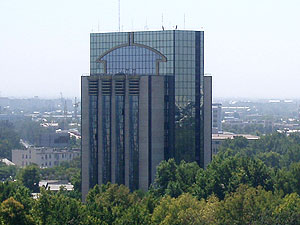The Central Bank of Uzbekistan proposed to amend the statute on capital adequacy requirements for commercial banks. The Bank’s draft has been posted for public input until March 7.
Today, the amount of all investments in the capital of non-consolidated economic entities, including debt obligations, which form the capital of such economic entities, is deducted from Tier 1 capital. The regulator proposed, as an exception, not to include here investments made before December 1, 2023 to finance the launch of renewable (energy-saving) energy sources, including large solar and wind power plants, solar panels and small photovoltaic stations.
In addition, the Central Bank propose to zero the risks on loans provided until December 1, 2023 to finance the construction of renewable energy facilities, including large solar and wind power plants, solar panels and small photovoltaic stations.
Balance sheet assets are divided into five groups according to the degree of risk: 0-, 20-, 50-, 100- and 150 percent. The relative risk of different categories of assets depends on the type of incurrer and the nature of the guarantee or collateral. For example, cash carries 0% risk, while commercial loans are categorized as 100% risk. This means that commercial loans must be fully backed by a certain amount of capital.
Possible consequences
Financial analyst Otabek Bakirov believes that if such a decision is made, then in 2024 Uzbekistan may face double-digit numbers for non-performing loans (NPL), since these loans for renewable energy will not differ from those soft loans that are allocated for the utilities sector and family businesses. As of January 1, 2023, this figure stands at 3.6% (13.99 trillion soums).
In his opinion, the situation may be aggravated by the lack of a feasibility study and parameters for the construction of future solar power plants.
“Because the process of decision-making, financing, procurement and supply is completely in the hands of the state and authorities. Risk assessment and market measurement are completely omitted,” he said.
The financier called “economic populism” the zeroing of risks on loans allocated to finance renewable energy facilities until December 1, 2023.
“The central bank should not make such proposals to please the government, but should actually restrain the government from such actions. In addition, setting a zero risk level for assets with a high risk profile is completely contrary to the Basel III standards of the Basel Committee,” he said.
President of Uzbekistan Shavkat Mirziyoyev announced on February 8 that it is planned to allocate $1 billion for the introduction of renewable energy sources in Tashkent. In particular, solar panels will be installed on the buildings of multi-storey residential buildings, social facilities, government agencies and private enterprises, industrial zones, car parks and large water structures.
On February 16, the President signed a resolution to accelerate the introduction of renewable energy and energy-saving technologies in 2023. The document introduces from May 1 the requirement to install solar panels on at least 50% of the free part of the roof of multi-storey residential buildings being commissioned.
From April 1, individuals and legal entities that have installed equipment for renewable energy sources with a capacity of up to 100 kW, from April are exempt from paying property tax in the form of this equipment, tax on land occupied by it, and tax on profits received from the sale of generated energy .
However, the media began to receive reports that in the Andijan and Navoi provinces, businesses and residents are being forced to install solar panels, including through loans. The governor and mayor’s officed stated that the work is carried out “without coercion”, the benefits of alternative energy are explained to households. To install the panels offer preferential loans.












